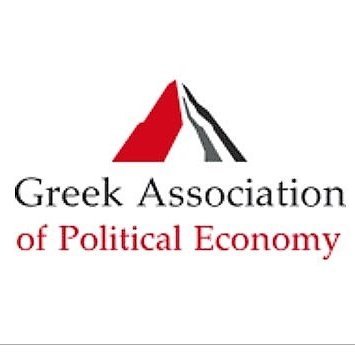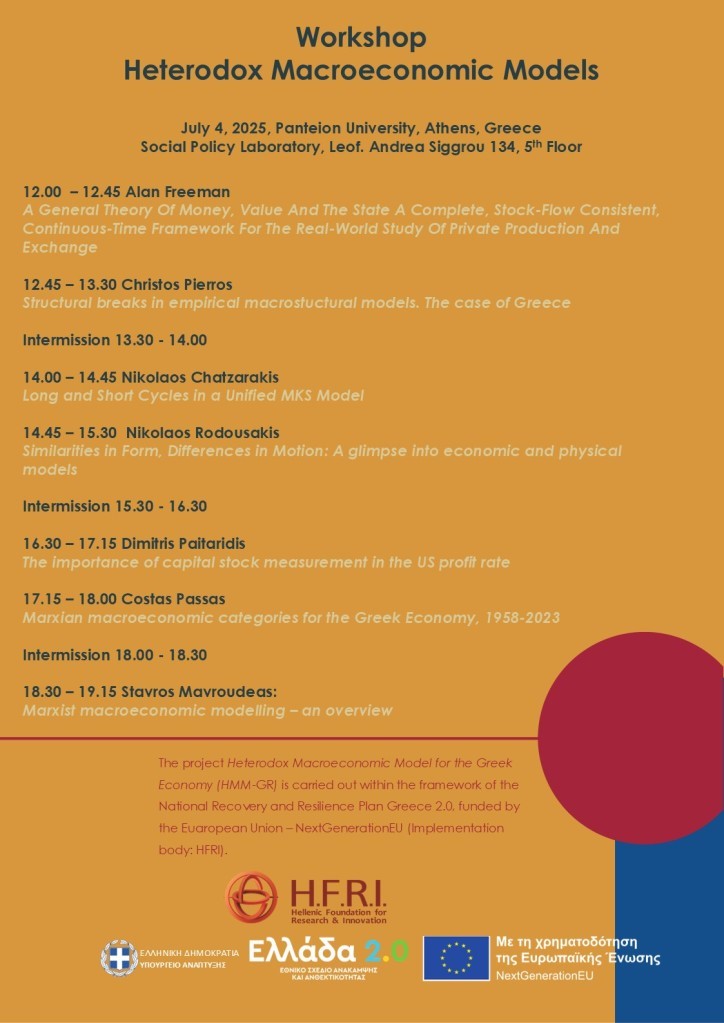International Conference of Political Economy (ICOPEC) 2018, 6-9 September, Panteion University, Athens
ICOPEC 2018
6-9 September 2018
Panteion University, Athens, Greece
Main theme:
’10 years after the Great Recession: Orthodox versus Heterodox Economics’
The 2007-8 global crisis (broadly branded as the Great Recession) is the fourth major global crisis of the capitalist system (after those of the 1870s, 1929 and 1974). Its consequences continue to rock the world economy as it was followed by a period of weak economic performance and, moreover, fears of a new crisis continue to linger on.
The Great Recession came after several decades of neoliberal restructuring that enhanced capital’s profits at the expense of labour, increased inequalities and augmented poverty. However, despite all these the crisis erupted and shattered all the official projections about a bright and smooth path of capital accumulation. Moreover, it shattered the dogmas of economic Orthodoxy about the Great Moderation; that is their belief that the neoliberal structural and institutional changes in the developed economies during the last decades of the 20th century have reduced permanently the volatility of economic fluctuations. Thus, the Great Recession not only disrupted the tranquility of capitalist reproduction but also discredited the prevailing Orthodoxy in economic theory. The latter has become increasingly dogmatic during the years of neoliberal restructuring by resorting to ultra-conservative perspectives based on extremely technical and at the same time utterly unrealistic economic models.
Usually, in such circumstances when there is a great crisis that discredits the prevailing economic theory, there is a change of scientific paradigm. This has happened, to a great extent, in all previous major global crises. Notwithstanding, it appears that this time this is not the case. After the initial shock and the implementation of hasty policy measures in order to contain the crisis, economic Orthodoxy remained at the helm. Particularly in the academia it became even more dogmatic and less tolerant to any dissenting and Heterodox voice.
The focus of the main theme of ICOPEC 2018 is exactly on this riddle. How a very problematic theory continues to survive and dominate both the policy and the academic scene. What are the processes in the economy and the society that sustain its dominance? Is the resolution of the Great Recession final or it entails more upheavals in the near future? What is the condition of the economic Orthodoxy (particularly under its current form of the New Macroeconomic Consensus, that is the hybrid of mild neoliberalism with conservative New Keynesianism)? What is the condition of contemporary economic Heterodoxy? Is it a unified current or it encompass diverse and possibly contradictory perspectives? What is the current state of affairs in Political Economy? Last, but not the least, how all these affect the lives and the well-being of the great labouring majority of contemporary societies?
Of course, apart from its main theme, the ICOPEC 2018 invites all contributions that enrich the perspective of Political Economy and expand the ground for further discussion. Indicatively, proposed papers can touch upon the following issues (for a more detailed list visit ICOPEC 2018 website):
• Global Economy, Economic Crises, and Recessions
• Poverty, Inequality, and Income Distribution
• Economic Development
• Public Economics, Public Finance, and Public Management
• Business Enterprises in Turbulent Environment
• Labour Economics
• Demography, Gender, and Migration
Important dates
• 1 July 2018: Abstract Submission (Extended deadline)
• 20 July 2018: Notification of Approval
• 20-30 July 2018: Early Registration
• 1-5 August 2018: Late Registration
• 20 August 2018: Full Paper Submission for e-Book (Not Obligatory)
• 22 August 2018: Final Program
• 6-9 September 2018: Conference Dates
Publication Possibilities
All accepted papers will be published by IJOPEC as an e-book with ISBN before the conference and as an edited e-book by IJOPEC Publication (co.uk) after the conference (December 2018)
Also, selected papers will be published in 3 edited international books and peer reviewed journals such as «Bulletin of Political Economy» (http://www.serialsjournals.com/journal-detail.php?journals_id=11), «World Journal of Applied Economics» (http://journal.econworld.org/index.php/econworld), and «Çalışma ve Toplum», after the conference.
Authors must submit the revised version of their papers by the specified deadline. Please note that IJOPEC will be under no commitment to publish all presented chapters in the edited books. Articles must be written in English and proofread before submission. All articles submitted should be in accordance with the main themes of ICOPEC 2018. Also, the journals mentioned above will be under no commitment to publish all the articles. The authors should follow the submission guidelines of the journals, which can be found on the journals’ web pages.
The deadline to submit your manuscript for Proceedings e-Book is 1st of August 2018.
Abstracts should be submitted at http://www.icopec.org/icopec2018/submission-form.html and manuscripts sent to bilgi@icopec.org.
The members of the Greek Association of Political Economy and Greek participants should submit their abstracts at politiceconomy@gmail.com as special rates pertain.
For Full Papers you can reach the author guidelines at www.icopec.org/icopec2018/Author-Guidlines.html
The ICOPEC 2018 conference is organized by the:
• Greek Association of Political Economy
• Panteion University
• VUZF University
• University of Belgrade
• IJOPEC publication
And is supported by the University of Westminster.
Organizers



Supporters










